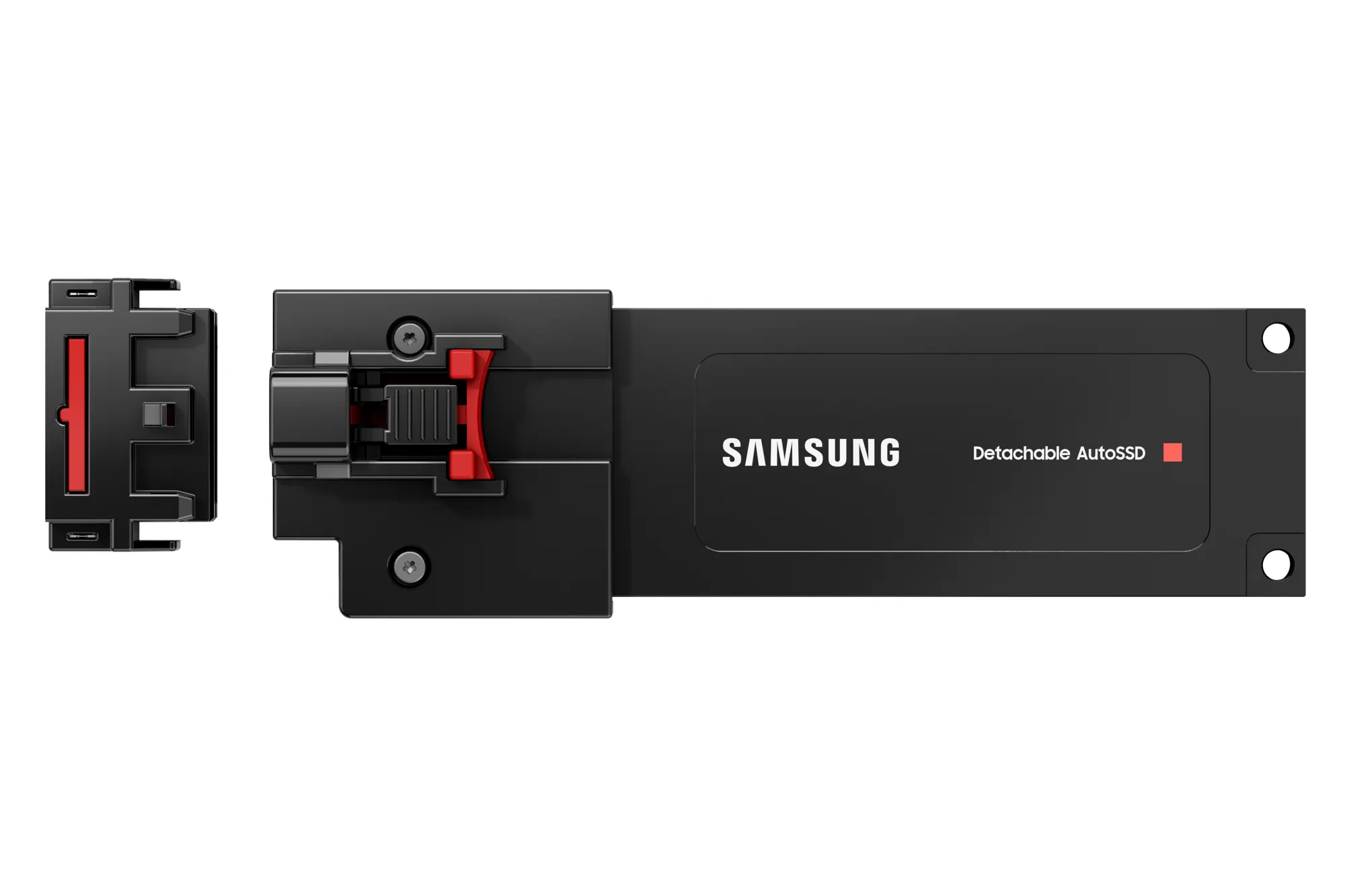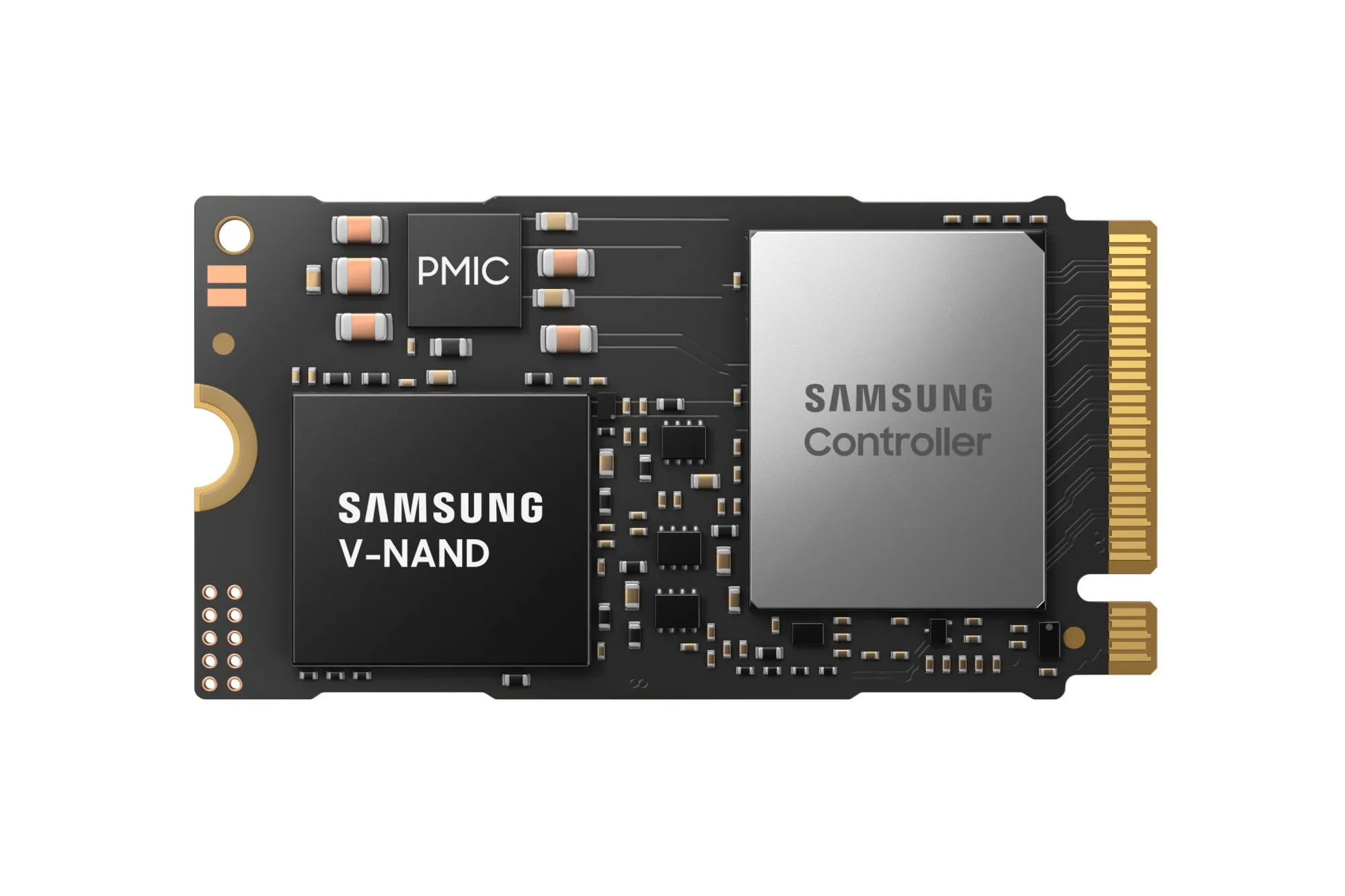Samsung has offered an early glimpse at two storage innovations set to debut at CES 2026 in Las Vegas this January. The company’s preview showcases a modular automotive SSD with independently swappable components and a compact M.2 2242 variant of its PM9E1 PCIe 5.0 drive capable of housing up to 4TB of storage.
Detachable AutoSSD Targets Automotive Market

Building on last year’s AM9C1 automotive SSD, Samsung’s new AM9C1 E1.A, marketed as the Detachable AutoSSD, uses a modular architecture that separates the controller from the NAND flash into independently replaceable modules. Where the original AM9C1 came as a ball grid array (BGA) drive, this E1.A variant allows for component-level upgrades without replacing the entire unit.
The original AM9C1 features Samsung’s proprietary 5nm PCIe 4.0 controller paired with 8th-generation V-NAND flash, delivering sequential read speeds up to 4,700 MB/s and write speeds up to 1,400 MB/s when operating in SLC mode. The E1.A version maintains these components but adds flexibility through its modular form factor. According to Samsung, this design could enable automotive manufacturers to swap in a faster PCIe 5.0 controller down the line or increase storage capacity.
Samsung also claims the modular E1.A form factor extends operational lifespan through improved heat dissipation compared to traditional BGA packages.
Automotive Storage Demands Drive Innovation
Autonomous and semi-autonomous vehicles generate substantial data volumes that require robust onboard storage. Connected vehicles can generate anywhere from 1.4TB to 19TB per hour depending on configurations. Traditional BGA solutions offer excellent board-level reliability and vibration resistance, making them well-suited for automotive environments.
However, modularity comes with its own set of trade-offs. While the modular SSD could reduce long-term costs through component-level upgrades and simplified repairs, questions remain about whether the socketed connections can match BGA’s shock and vibration tolerance in demanding automotive conditions.
Whether Samsung intends to bring this modular concept to consumers is not clear, but the technology could theoretically translate to mainstream SSDs.
PM9E1 M.2 2242: High-End Storage in a Compact Package

Samsung’s second reveal focuses more on size reduction rather than architectural innovation. The PM9E1 M.2 2242 puts PCIe 5.0 technology into a compact form factor measuring just 42mm in length, which is roughly half the size of the standard 2280 drives found in most desktop and laptop systems.
This drive is an OEM variant of the Samsung 9100 Pro, which became available in an 8TB capacity earlier this year. Inside, you’ll find Samsung’s 5nm Presto controller and 8th-generation V-NAND TLC flash. The PM9E1 M.2 2242 delivers sequential read speeds up to 14.8 GB/s and write speeds up to 13.4 GB/s.
M.2 2242 is a niche form factor that (in)frequently appear in in ultra-thin laptops, tablets, and compact mini-PCs where board space is limited. There isn’t much PCIe 5.0 competition at this size, though Corsair’s MP700 Micro recently arrived with sequential speeds reaching 10,000 MB/s read and 8,500 MB/s write.
What stands out in both cases is the 4TB capacity option that doubles what’s currently available in this and the even smaller M.2 2230 form factor used by devices like the popular Steam Deck handheld.
Samsung plans to share additional specifications, pricing, and availability information for both the AM9C1 E1.A Detachable AutoSSD and PM9E1 M.2 2242 during CES 2026, scheduled for January 6-9, 2026, at the Las Vegas Convention Center.